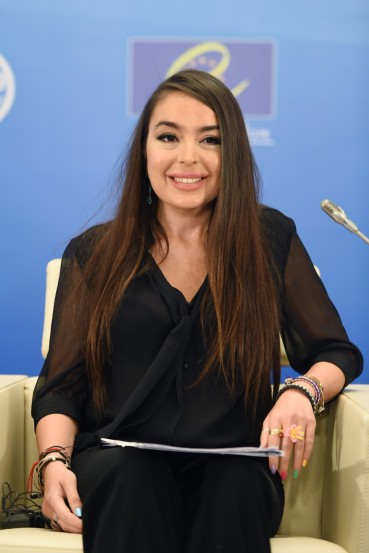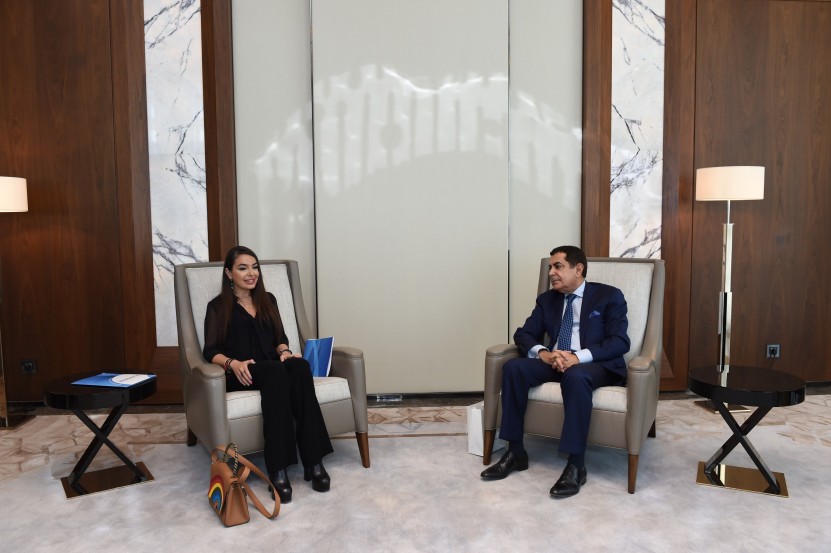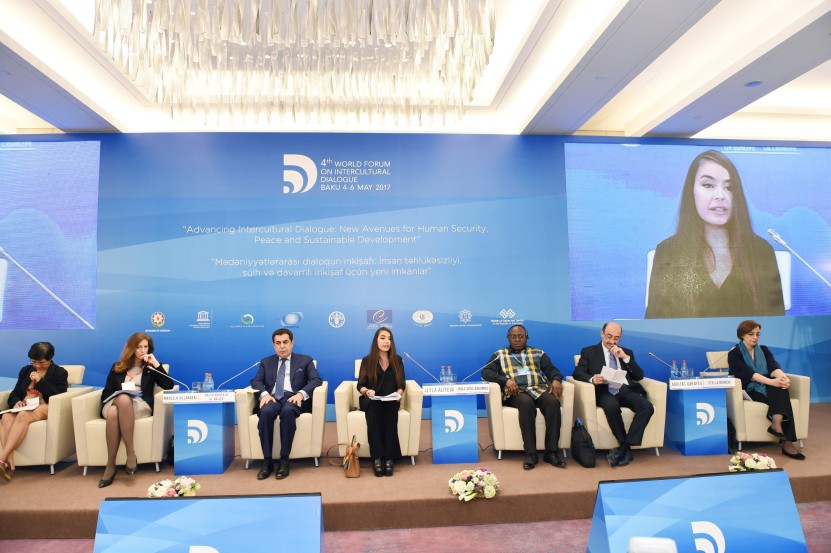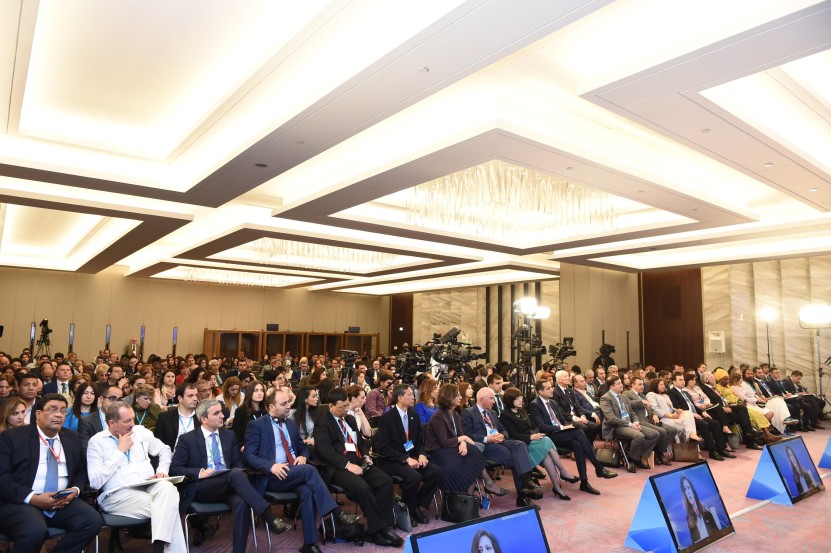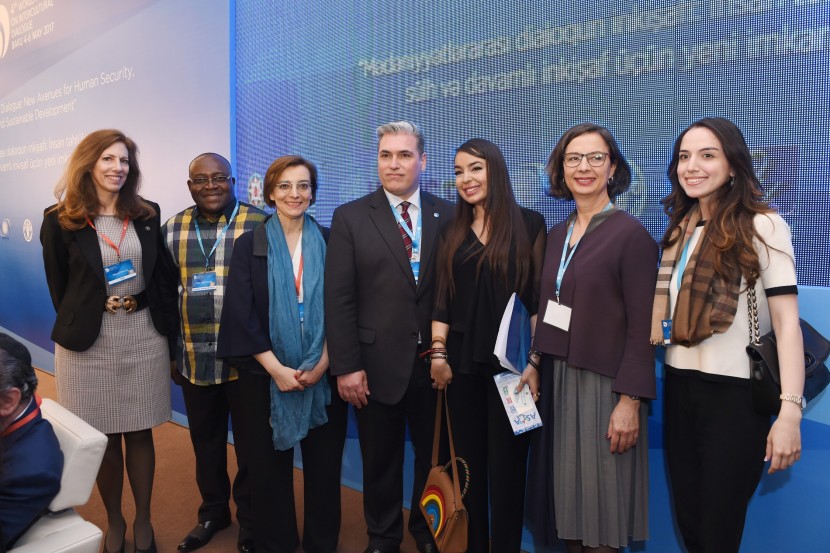Leyla Aliyeva: Intercultural Dialogue Must Be Promoted for Food Security and a Sustainable Society
On May 6, within the framework of the IV World Forum on Intercultural Dialogue, the second plenary session on "Intercultural Dialogue for Food Security and a Sustainable Society: Core Elements for Ensuring Sustainable Development and Peace" took place.
The Goodwill Ambassador of the United Nations Food and Agriculture Organization (FAO), Vice-President of the Heydar Aliyev Foundation, Leyla Aliyeva, participated in the session.
The attaché of the office of the Secretary-General of the United Nations Food and Agriculture Organization, moderator Rashad al-Khawaji, emphasized that the session is devoted to a topic very important for the modern world and expressed gratitude to the leadership of Azerbaijan for the high-level organization of the IV Global Forum.
Then, Goodwill Ambassador Leyla Aliyeva spoke at the session with the following words:
It is very pleasant that people from different parts of the world have gathered in Baku to discuss important issues of developing intercultural dialogue. Dialogue between cultures and peoples is the essential condition for peace and prosperity in the world. There is no acceptable alternative to this dialogue. The less dialogue and understanding between us, the more room there will be for enmity and ignorance. For centuries, Azerbaijan has been a place where different cultures, religions, and civilizations intersect. Throughout history, all peoples in Azerbaijan - Muslims, Jews, and Christians - have lived peacefully together. In fact, this was not called "intercultural dialogue." Such interactions were simply a part of everyday life. That is why our native city, beautiful Baku, has now become one of the centers of intercultural dialogue. Baku has become a meeting place for people from different backgrounds from all corners of the planet, striving to make the world better.
I am very glad to speak at this plenary session because its topic is extremely important to me as a Goodwill Ambassador of FAO and an environmental advocate. Discussing food security, which is directly related to peace and sustainable development, makes this event especially important and necessary today. We all know that intercultural dialogue is an important counterforce against the rise of racism and violence on a global level. However, its scope also includes promoting ideas of tolerance and coexistence, as well as seeking new innovative ways to achieve our common goals.
The adoption of the 2030 Agenda for Sustainable Development was a significant event for the world's population in the mission of ensuring the well-being of people living on our planet. It is no coincidence that the first two goals of the agenda are aimed specifically at eradicating poverty and hunger. By achieving these goals, which reflect a common stance, we can create peaceful, inclusive, and sustainable societies.
In reality, we are deeply saddened that in the 21st century, 870 million people worldwide still suffer from hunger and malnutrition. This happens at a time when a third of food and food products globally are thrown away as waste. Climate change complicates this situation. At the same time, globalization in agriculture is characterized by indifference to biodiversity and traditional knowledge. Excessive dependence on one another and access to products strike a blow to our ecosystems. Throughout history, cultures and peoples have forged connections through their cuisines and culinary traditions. They preserve their traditions. Preserving this contributes to food security, peace, and sustainable development. Of course, strengthening intercultural dialogue actually contributes to the dissemination and preservation of traditional agricultural knowledge. In other words, we must confidently unite our efforts to ensure our products are the products of the future. Naturally, food distribution itself is a form of intercultural dialogue. Since culinary culture is a means for people to come together, overcome stereotypes, and understand different ways of life.
The time has come. The international community must direct its efforts toward improving food security and nutrition, intercultural dialogue, and well-being. In this regard, I welcome the event held at FAO headquarters in October, dedicated to protecting interfaith cultural identity and differences through food security, with the support of Azerbaijan, the United Nations, and other partners. This event is, in fact, a continuation of the "Baku Process." It will contribute to the spread of tolerance and the elimination of cultural differences through food.
Dear friends, no country or organization can solve such universal issues as food security, environmental protection, and sustainable development alone. Dialogue is extremely important for the implementation of the global development agenda. Considering this, we established IDEA - the International Dialogue for Environmental Action Public Association - in 2011. Our goal is very simple. We would like to be a public platform for ensuring a safer and healthier, more environmentally friendly future. Our motto is: "One planet – one future." As for the scope of IDEA's projects, we are working on education, awareness, waste management, and sustainable development. Over the past five years, our young organization has achieved excellent results. We have planted over five million trees across the country. We plant trees not only in our country but also in other countries. We have also protected gazelles from the threat of extinction. In this regard, we have implemented several conservation projects. We are also implementing other projects, all of which stem from our current initiatives. This is especially true for the restoration of the Caucasian leopard and bison in the Caucasus. At the same time, we are taking other steps in this context. Last year, IDEA proposed a very important project to clean the Kura River delta to protect the beluga in the Caspian Sea. The goal of this project is to increase fish stocks, improve water quality, and enhance the ecology around the rivers. I would also like to note that a few weeks ago, we proposed an initiative to create fruit gardens for low-income families in Azerbaijan. We are implementing this project jointly with FAO. Within the framework of this project, we plan to plant fruit trees in rural areas. This will become a source of income for these families. I would like to express my deep gratitude to FAO. I thank the head of the FAO office in Azerbaijan, Ms. Melek Cakmak, for this partnership and efforts. Regardless of our religion, race, or customs, we all live on one planet. We have a common future. Ecology has no borders. The reality is that today, human activity and anthropogenic factors disrupt the laws of nature and lead to great catastrophes. People should appreciate the wealth they possess. In this context, I want to quote a famous American director, producer, and author, Tom Shoydak: "In nature, nothing takes more than necessary. The redwood does not absorb all the nutrients from the soil, it takes as much as it needs to grow. A full lion does not chase a gazelle to kill it." People should also adhere to these laws of nature. The lifestyle and habits of each person affect ecology. We can make significant changes to protect our common planet. This can ensure our sustainable development. Therefore, intercultural dialogue must be constantly promoted for food security and a sustainable society.
Dear guests, I am confident that during the days of your stay in our country, you will try our delicious dishes, see cultural monuments, and get to know the locals. I am sure this experience will further expand your diversity potential.
Being open to diversity and dialogue means building bridges of understanding between different groups. Together, we can reduce conflicts and tensions. Such bridges are not built in official negotiations and meetings, but through behind-the-scenes work. In view of this, I urge you to always be open to dialogue.
I wish you happiness, success, and prosperity.
In his speech, UN High Representative for the Alliance of Civilizations Nassir Abdulaziz Al-Nasser highly praised the hospitality shown in Azerbaijan and said that guests visiting Baku wish to return to our capital once again.
Noting that food issues are one of the priorities of the UN Alliance of Civilizations, Nassir Abdulaziz Al-Nasser stated that they are cooperating with FAO on this matter. The UN official, touching upon the issue of people facing the threat of hunger in various countries, noted the importance of food security for the world. The high representative, emphasizing that intercultural dialogue is an important means of ensuring food security, said: "We are also attracted by the issue of human security. Food security encourages the emergence of commercial interests and intercultural ties. Thousands of people around the world die from hunger. Children in Yemen, Somalia, and Sudan suffer from hunger. By strengthening vulnerable communities, we can prevent the threat of food security. If people from different cultures come together and share their experiences, we can achieve results."
The Minister of Culture and Tourism of Azerbaijan, Abulfas Garayev, stated that food, culinary, and nutrition are part of our daily lives. "It is very good that FAO is participating in this forum and pays attention to food security at the same level as human security," said Abulfas Garayev and emphasized that low-quality food products harm people's security. According to him, food, customs, and traditions, climate, and the environment are manifestations of each nation. The Minister of Culture and Tourism noted that to enrich each other, it is not enough to simply read a neighboring country's book. Culinary and national cuisine are also among the important qualities of a nation. In this context, Abulfas Garayev said that there is a great variety of foods in our country.
Director of the FAO Partnership, Advocacy, and Capacity Development Office Marcela Villarreal highly appreciated the representation of all FAO partners in the "Baku Process." She noted that currently, millions of people around the world suffer from hunger. This is a problem related to food production and the level of people's access to food. Marcela Villarreal, pointing out the increase in population in the future, emphasized the importance of increasing food production by 60 percent. The forum participant, who considers it important to engage in intercultural dialogue to achieve this, said that people should exchange knowledge and experience.
During the session, a video message on food issues was delivered to forum participants on behalf of FAO. The message emphasized the necessity of ensuring that every man, woman, and child worldwide is provided with the healthy food they need.
The session's moderator, attaché of the UN Food and Agriculture Organization's Secretary-General Office, Rashad Al-Khawaji, spoke about the role of intercultural dialogue in ensuring food security and expressed gratitude to FAO for participating in the "Baku Process."
Then the session continued with discussions.
The Secretary-General of the Asian Farmers' Association for Sustainable Agricultural Development, Estrella Penunia, noted the role of women in the development of agriculture.
Member of the Italian Parliament Stella Bianki stated that, like other rights, the right to food security should also exist.
The Minister of Culture and Tourism of Azerbaijan, Abulfas Garayev, noted that food security is considered a strategic priority in our country and special attention is paid to agriculture.
The mayor of Bangui, the capital of the Central African Republic, Emile Gros Nakombo, stated that the topic of food security covers all aspects of our lives and emphasized the possibility of achieving progress in agriculture worldwide. He said, "Leyla hanim recalled the project to protect gazelles. This is a very noble cause. It would be wonderful to instill this in young people in schools."
Director of the FAO Partnership, Advocacy, and Capacity Development Office, Marcela Villarreal, touched upon the issue of creating a land fund in Colombia.
The session participants held an extensive exchange of views on the state of food security worldwide.

